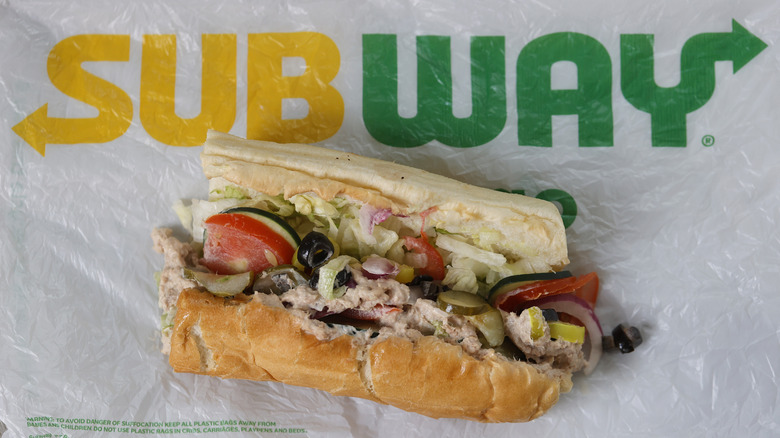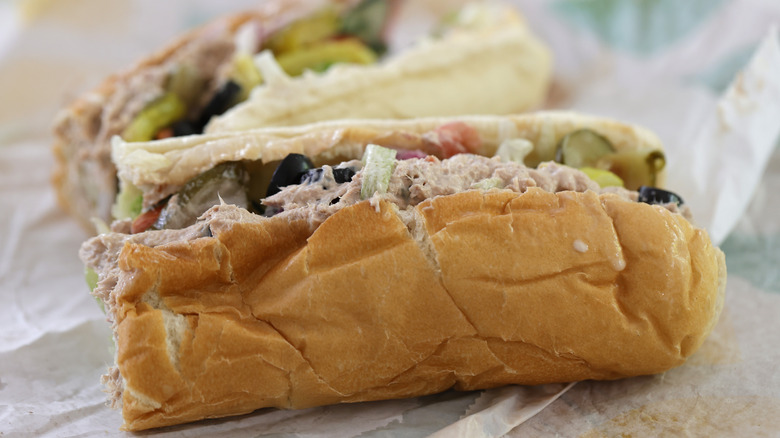The Real Reason Subway's Tuna Sandwich Legal Battle Rages On
If you're a fan of sub sandwiches then you've probably eaten at a Subway sandwich shop at least once or twice. Founded in Connecticut in 1965, Subway has grown over the years to become a major international fast food chain, currently boasting more than 36,000 locations worldwide (via Statista). According to Insider, the chain's boom occurred during the 1990s and early 2000s, when it rebranded itself as a healthy option in the fast food landscape.
But the recognizable sandwich chain who fresh-baked bread smell tends to waft out into the street, luring customers inside (via Observer), has been facing some serious troubles in recent years. Store sales have been declining since 2014, according to Insider, and the chain shuttered nearly 2,400 locations in 2020 (via Restaurant Business). So when the chain was sued last January by two Bay Area residents who claimed to have had the chain's tuna salad tested by labs which supposedly turned up nearly no evidence of tuna DNA (via The New York Times), you could say that the chain definitely did not need such attention. That complaint as well as a second one issued last June were both dismissed by a federal judge, but a third one brought against Subway last November was recently upheld.
The continuing complaints allege that Subway tuna salad doesn't contain tuna
When Bay Area residents Karen Dhanowa and Nilima Amin filed their first lawsuit against the Subway last January, the complaint alleged that the sandwich chain's tuna salad didn't contain any identifiable tuna DNA according to the results of 19 DNA barcoding tests conducted by the Barber Lab at UCLA's Department of Ecology and Evolutionary Biology (via The Washington Post). The plaintiffs argued that by claiming its tuna salad contained tuna, Subway could charge a premium price for its tuna-based items.
When the plaintiffs had 20 samples of Los Angeles-sourced Subway tuna tested by UCLA's lab, 19 of them failed to identify any tuna DNA, with all 20 samples containing "detectable sequences of chicken DNA," according to the plaintiffs, 11 samples containing pork DNA, and seven including cattle DNA. Last summer, The New York Times also had an L.A.-sourced tuna sample tested with PCR testing, which also failed to find any tuna DNA. Subway, for its part, has stridently denied that its tuna salad contains any other proteins besides tuna fish, claiming that since the tuna that has been tested has been both processed and cooked, it's no longer accurate to have it tested by a lab (via The Washington Post).
The plaintiffs' two previous complaints were dismissed
Federal judges have twice dismissed the complaints that Subway's tuna salad doesn't contain tuna, stating that Dhanowa and Amin failed to prove that they purchased tuna sandwiches based on misrepresentations from Subway (via The Washington Post). But this time, the plaintiffs' amended complaint was upheld, according to The Washington Post. U.S. District Court Judge Jon S. Tigar didn't dismiss the plaintiffs' claim that Subway's tuna products contain "other fish species, animal species or miscellaneous products" — seeing as how those lab tests turned up other meat DNA.
Subway has responded to the most recent claim by stating that those samples contained the DNA of other proteins due to cross-contamination when employees make a series of different sandwiches using the same gloves, knives, and cutting boards. But Tigar wrote in his decision that "even if the Court accepted Subway's statement that all non-tuna DNA must be caused by cross-contact with other Subway ingredients, it still would not dismiss the complaint on this basis. Whether, and to what extent, a reasonable consumer expects cross-contact between various Subway ingredients is a question of fact" (via The Washington Post). Basically, Judge Tiger is stating that the reason for contamination with other DNA might not matter to a customer, who expects a tuna sandwich to contain tuna and no other fish or animal species.
Dhanowa and Amin now have 21 days to file an amended complaint — their fourth against Subway, if they choose to move forward.


